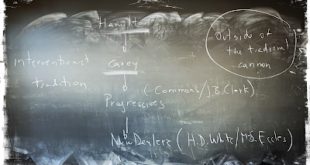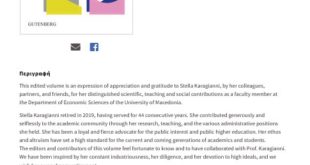Milton Friedman revolutionized macroeconomics with his 1967 presidential speech to the American Economics Association (AEA), which presented a theory of the so-called natural rate of unemployment for the first time. That speech, which played a major role in discrediting the brand of Keynesianism that prevailed in postwar liberal economic policy thinking, remains one of the […]
Read More »Causes and consequences of the Ukraine conflict: an eight-point primer
(1) The origins of the Ukraine conflict lie in the ambitions of US Neocons. Those ambitions threatened Russian national security by fuelling eastward expansion of NATO and anti-Russian regime change in the Republics of the former Soviet Union. (2) The Ukraine conflict is now a proxy war. The US is using Ukraine to attack and […]
Read More »The American Political Economy Tradition
If Cohen and De Long (2016) are to be believed, there is an American Political Economy tradition, that harks back to Alexander Hamilton, that goes against the free market canon of the profession. In their view, the American Political Economy tradition consist of an interventionist approach to economic policy, that arguably should be seen as neomercantilist [1]. Classical political economy, as represented by their main figures in the United Kingdom, Adam Smith and David Ricardo, upheld the...
Read More »Keynes’ denial of conflict: why The General Theory is a misleading guide to capitalism and stagnation
Keynes’ General Theory was a massive step forward relative to classical economics, but it was also a step backward in its denial of the conflictual nature of capitalism. There is need to understand Keynes’ technical contributions regarding the workings of monetary economies, but also need to understand the flaws within his thinking and the consequences […]
Read More »Mavroudeas S. (2022), ‘The adventures of Economic Policy within Mainstream Economics’ in Essays in Economic Theory and Policy in Honor of Professor Stella Karagianni, Athens: Gutenberg
Economic Policy covers the aims and the instruments of state economic interventionism. As a broad problematique it existed from the very birth of the science of the economy. However, as a special subject-area it was inaugurated in the interwar era and formalized by the beginning of the post-World War II era. Since then, Economic Policy faced serious ups and lows within economic analysis and policymaking. Particularly within Mainstream Economics (the nowadays dominant tradition within...
Read More »World Cup, RT CrossTalk, and US domestic censorship
Most of the time I write dense blogs & research papers. I sent the e-mail below to someone close to me. Afterward, I realized it tacitly says a lot about the state of our society (liberals included). Sometimes, mixing things and writing about them in a different way can be revealing. Sent: Saturday, December 17, […]
Read More »Deglobalization, conflict, & the self-inflicted threat to democracy: consequences of US imperial over-reach
Because of the seriousness of the world situation, I have decided to get back in the business of doing interviews (which I do not enjoy doing). Here is a link to my interview (13/12/2022) on RT CrossTalk discussing “New Globalization?” In that connection, here is a link to a paper (written in 2018) titled “The […]
Read More »Comments on the history of the Review of Keynesian Economics on its tenth anniversary
This Fall (October/November 2022) marks the tenth anniversary of the founding of the Review of Keynesian Economics (ROKE). The founding co-editors were Louis-Philippe Rochon, Matias Vernengo, and I. At the beginning of 2018 Louis-Philippe Rochon stepped down to become sole editor of the Review of Political Economy and he was replaced by Esteban Pérez Caldentey. […]
Read More »The false promise and bitter fruit of Neoliberalism: political economic disembedding, cultural transformation, and the rise of proto-fascist politics
Neoliberalism is a political economic philosophy that consists of two claims, one economic and the other political. The economic claim is free market laissez-faire economies are the best way to organize economic activity as they generate efficient outcomes that maximize well-being. The political claim is free market economic arrangements promote individual liberty. This paper argues […]
Read More »Sabotaging Germany, blaming Russia: another view of the Nord Stream pipeline attack
Imagine Moscow was nuked yesterday, and this morning The New York Times ran a frontpage headline “Moscow nuked: Russia proves its hostility to Europe again”. Sounds pretty crazy? Yet, in a manner of speaking, that is what happened last week. On Tuesday September 27th three major leaks caused by undersea explosions were discovered in the […]
Read More » Heterodox
Heterodox


